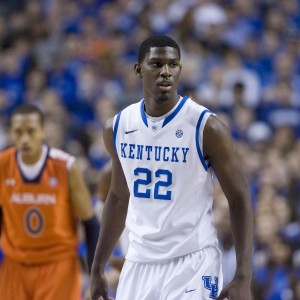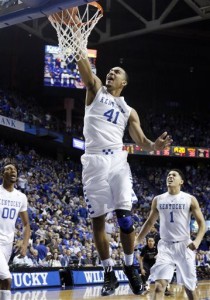Kentucky’s Rotations Most Impacted by Alex Poythress Injury
Posted by David Changas on December 16th, 2014News that broke late last week that Kentucky forward Alex Poythress would miss the remainder of the season with an ACL injury was met generally with the notion that the Wildcats are so deep, so talented, and have such good overall chemistry that it will not impact their quest to win the national championship. Given the Wildcats’ subsequent performance in an 84-70 thumping of North Carolina in Lexington — a game the Wildcats controlled from the start — it’s understandable that people would feel that way. But it’s also impossible to take too much from one game, and any definitive statement of how the loss of the 6’8″ junior forward will be felt is premature.
There is no question that Kentucky’s depth, and the quality of it, is unmatched in college basketball. The Wildcats have operated well under John Calipari’s much-discussed platoon system, as no one on the team averages more than 24.5 minutes per game. For his part, Poythress played just over 20 minutes per game in his eight contests, and his overall numbers were nothing special. He averaged 5.5 points and 3.8 rebounds per outing, and often appeared lost in the shuffle on the offensive end. Still, given his size and athleticism, he is projected by several outlets as a second rounder in the 2015 NBA Draft. As an explosive leaper with a propensity to make astounding plays, his demonstrated ability to guard athletic wings on the perimeter will be missed because Kentucky does not have anyone else who can be classified as a true small forward.
Despite the positives that Poythress brought to the Wildcats, Kentucky is well-positioned to overcome his injury. His offensive contributions were minimal — he was 0-of-7 from three-point range on the season — and a complete non-factor on the perimeter. While he was a relatively effective rebounder, freshman Trey Lyles — the player most likely to benefit from Poythress’ absence — averaged nearly two more rebounds in two fewer minutes per game. The 6’10” freshman is not as athletic as Poythress, but his presence means the Wildcats will have more size on the floor more often. Given the way that teams of all calibers have reacted to that size — North Carolina shot 45 percent from the field, by far the best any team has done against the Wildcats this year — that is a scary thought. And while Lyles may have trouble guarding smaller, quicker forwards, he presents problems of his own and is more polished offensively than Poythress.
The other obvious question about Poythress’ absence is the impact it will have on the platoon system. Realistically, it can no longer function as Calipari planned. Kentucky still has more depth than most teams, but the Wildcats now go nine deep and Calipari has to keep his best players on the floor as the competition improves. This has already started happening to a certain extent. Junior Willie Cauley-Stein has begun to separate himself with 33 minutes against Texas and 28 against North Carolina. Marcus Lee’s minutes, on the other hand, have dropped, logging only four minutes against the Longhorns and 12 against the Tar Heels. Lyles obviously stands to see more playing time in lieu of Poythress, and while team balance will remain important, Calipari’s substitution patterns may become a bit more organic heading into the new year.
If you consider Kentucky’s performance against North Carolina, it does not appear the Wildcats will miss much of a beat without Poythress in the lineup. With only three games in the next three weeks, the team will have plenty of time to adjust. So while some changes may be required to Calipari’s strategies — both platoon and defensive — his absence will not change the fact that Kentucky is still the prohibitive favorite to win the national championship.












































